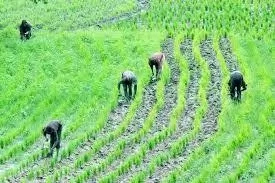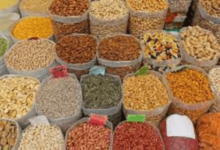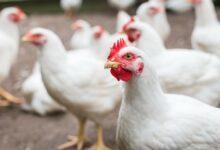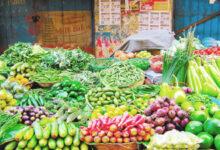How to start rice farming in Nigeria
Farming and agriculture in general remains one of the potential but underutilized sectors in Nigeria. The amount of rice consumed daily by Nigerians is relatively very high.
There is basically no Nigerian home where rice is not consumed almost on a daily basis; it is major cereal and a convenient source of carbohydrates and fibre among other minerals like magnesium.
👉 Relocate to Canada Today!
Live, Study and Work in Canada. No Payment is Required! Hurry Now click here to Apply >> Immigrate to CanadaAs a staple food in every home, eatery or restaurants, the demand is way too high. Nigeria is unable to produce large quantities to meet the teeming demand, hence we resort to importation.

Rice farming is being supported by the government through loans and grants to ensure adequate supply. With basic knowledge and training, anyone ca successfully venture in rice farming, it is a high yield crop and there is less than four months between planting and harvesting periods.
As the second highest consumed cereal crop after corn, Rice is very healthy with several varieties. Large quantities of rice are consumed at parties and fast food joints; this only shows that the market for rice is very stable. I will highlight more in the next paragraphs.
How Lucrative is Rice Farming in Nigeria?
Nigeria is one of the largest rice consumers in Africa and in the world; like i mentioned earlier, rice is a staple food and will be found in every food joint and in nine out of ten Nigerian homes if you take a quick survey.
It is sad that our nation spends so much on the importation of rice when we have fertile vegetation for rice farming. Rice farming is lucrative a bag of local brown rice is sold for about 17,000 naira while a bag of polished rice costs 15,000 naira.
If your farmland can produce a hundred bags of rice, you will have 100 x 17,000= 1,700000 and 100 x 15,000 = 1,50000. Do I also need to add that you will sell your rice effortlessly?
Opportunities in the Rice market and the Need for Rice: Apart from the mass consumption of rice as a staple food which results in an excessive demand for it, the cereal is also used for the production of alcoholic beverages like beer, spirits and even sugar. Rice is also processed into flour for different purposes like baking, edible rice paper and for swallow.
The hull removed from rice is a very god livestock feed, it is rich in protein and is quite pricey. Rice farmers make good money from just selling husk to livestock farmers. Rice production in Nigeria is a very competitive industry, but the demand for rice lessens the effect of competition.
👉 Relocate to Canada Today!
Live, Study and Work in Canada. No Payment is Required! Hurry Now click here to Apply >> Immigrate to CanadaHow to Start Rice Farming
Rice can be grown on any soil with adequate water supply; to start your rice farm, you need to acquire the healthiest seeds available because only healthy seeds yield bountiful harvests. Healthy rice seeds are resistant to pests and diseases weed impact and produce more yield per hectare.
The National Agricultural seed council (NASC) can assist or render professional advice on the acquisition of healthy seeds.
Next, prepare seed beds in a nursery then plant your seeds, covering the beds with black polythene bags will prevent the seeds from contracting soil borne diseases.
Take note that planting seeds in a nursery before transplanting them improves the quality of the rice; transplant seeds to a swampy area which is most suitable for propagation of rice.
After planting, you need to enforce weed control, like every other crop, rice too needs ample space to grow well. Get rid of weeds as frequently as possible.
Fertilizer can be applied under the supervision of a pro and at the desired quantities only.
Four months after transplanting, your rice is ready for harvest, an indication of matured seedlings is a change in leaf colour from green to yellow or gold. After harvesting, farmers who lack rice processing equipment can sell the paddy rice in bulk to rice merchants.
Rice Production Tips:
Parboiling
Is the next stage immediately after harvesting, this involves boiling the rice to weaken the rice hull in order to ease the hulling process and to toughen the grains to reduce breakage during the hulling process. Parboiling is done by drenching the seeds and boiling them or by steam heating. The rice is then dried to a moisture level of about eighteen percent to prevent further breakage during hulling.
Milling
Is done with a rice milling machine, the process removes the rice hull and the grains at this point become brown rice. Polishing the brown rice by removing the outer layer known as the bran changes brown rice to polished or white rice.
In better developed countries, the polished rice is coated with protein to increase its nutritional value but in Nigeria where farmers face technological and monetary challenge, polished rice is barely coated with additional nutrients. I guess this explains why the brown rice is a healthier option.
Packaging
This is the last processing stage, rice is to be packaged according to the desire of the farmer, but it is important to use strong sacks that keeps the grains dry and free from pests during storage and transportation to middlemen or final consumers which maybe local or international; as Nigerians do export brown rice.
Training Required
Rice farming does not require intensive training; it is a straightforward and simple process. Once you master the basic processes by working in a rice farm or from attending a few training workshops, you are set. The number of staff you are going to hire is wholly dependent on the size of your farm; you will need hands for planting, weeding, harvesting and processing.
It is absolutely important to hire passionate and skilled labour. This also depends on the size of farm you intend to begin with.
Capital Required
Capital here is the sum total of your expenditures which include cost of farmland (if you don’t own one already), cost of acquiring seeds, tilling, irrigation, fertilizers, processing equipment, packaging, employing labour and other miscellaneous expenses. An estimated two million naira can set up a fairly large rice farm.
Advertising
Rice doesn’t require a lot of marketing because rice sells massively. It is a must have in every geographical or political zone in Nigeria. It sells faster than even garri and it is often referred to as the get rich quick crop.
As a fresher in the rice farming business however, you need to put up a word by all means possible. Contact potential customers, whole sellers and market your grains.
Location
Rice generally grows better on swampy areas, the farmers till the soil and carry out proper irrigation before planting but where you cannot access swampy lands, you can get a tractor to till the land and then channel water into it for proper irrigation. This will definitely incur additional; costs but it’s the best and most suitable environment for rice propagation.
Benefits of Rice Farming
Apart from the mass consumption of rice as a staple food which results in an excessive demand for it, the cereal is also used for the production of alcoholic beverages like beer, spirits and even sugar. Rice is also processed into flour for different purposes like baking, edible rice paper and for swallow.
The hull removed from rice is a very god livestock feed, it is rich in protein and is quite pricey. Rice farmers make good money from just selling husk to livestock farmers.
Challenges of Rice Farming
These include lack of experience, financial constraints, the cumbersome processes required to access loans to start up farms, poor storage facilities, theft, poor market facilities, existing competitors and attack from pests.
Conclusion
This directory on rice farming is quite interesting and compelling. Anyone interested is advised to make a move towards actualizing the goal of becoming a rice merchant. InfoGuide wishes you the best.




